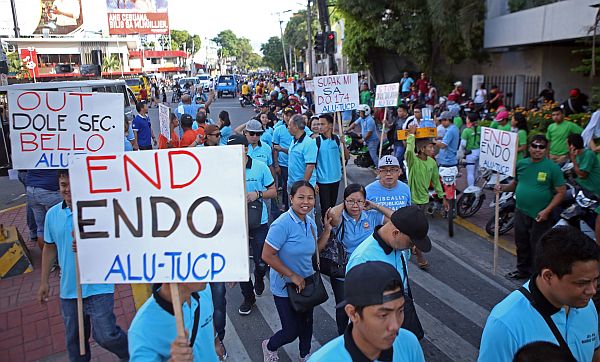
ALU-TUCP members rally in front of DOLE-7 to protest contractualization during the celebration of Labor Day.
(CDN PHOTO/LITO TECSON)
CONTRACTUALIZATION
The dialogue between labor groups and President Rodrigo Duterte during the Labor Day celebration in Davao City left a labor group in Cebu somewhat dissatisfied with the results.
Lawyer Jonas Asis, regional vice president of the Associated Labor Union-Trade Union Congress of the Philippines (ALU- TUCP), however, said the labor group is still hopeful that the next meeting with the President would produce the executive order they have been asking Mr. Duterte to issue that would totally abolish contract employment.
“We presented to him (President Duterte) the draft of the executive order. President Duterte said he needs to study it and will meet us again on May 10,” Asis said during 888 News Forum today.
Asis refused to give details of the contents of the draft they submitted to the President, saying it is still under review.
Labor leaders have urged Duterte even before the Labor Day to sign an executive order that would end contractualization in the country.
They also opposed Department Order (DO) 174 signed by Labor Secretarty Silvestre Bello III which prohibits labor-only contracting and other contractual arrangements.
DO 174 is actually a reiteration of the prohibited labor-only contracting, which is already in the Labor Code itself.
Labor groups, it would seem, want the provision of the Labor Code allowing contract workers to be repealed through an executive order that would ban contractualization.
Wages
Another concern raised by the labor groups is the provincial rate system for wages.
Dennis Derige, the coordinator of Partido Manggagawa – Cebu reminded President Duterte of his promise to abolish the system which provides for different wage rates in cities and provinces.
“For decades, this created inequity and wide disparities in wages between regions and provinces of the country,” Derige said.
Labor wants government to implement an across-the-board wage rate.
Engr. Elias Cayanong, regional director of the Department of Labor and Employment (DOLE-7), said this needs to be studied well.
He said there are factors considered in wage adjustment, which include consumer price index (CPI), inflation rates and workers’ purchasing power.
“All these things should be taken to determine their proposal (wage increase). We also need to check the management proposal like how does it affect the community and if there is no closure,” Cayanong said.
Philip Tan, a management representative to the Regional Tripartite Wages and Productivity Board (RTWPB-7) said that situation in Manila is different.
“The situation in Manila is different especially the cost of living. People do not go to Manila because of wages but because of opportunities,” Tan added.
The RTWPB-7 approved an additional P13 wage adjustment last February.
“We can check if companies have fully implement the adjustment after two to three payroll periods. That will be our evidence,” Exequiel Sarcauga, RTWPB-7 chairman, told Cebu Daily News.
At present, minimum wage is classified through income class of the cities and municipalities.
For expanded Metro Cebu (from Carcar City to Danao City) which is under Class A, wage rate is P366 per day.
For Toledo and Bogo cities (Class B) minimum wage for workers is P333 while for Bantayan and Camotes Islands (Class C) the daily rate is P308.